French singer Mireille Mathieu (1946) has recorded over 1200 songs in eleven languages, with more than 150 million albums sold worldwide. She also appeared in a few films.
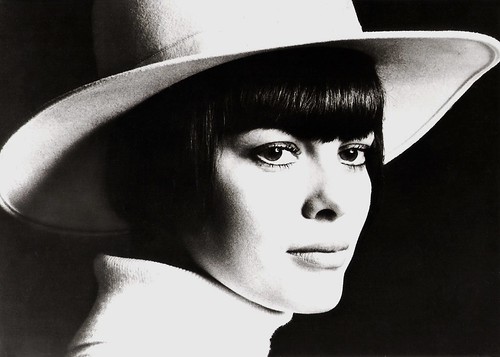
East-German postcard by VEB Bild und Heimat Reichenbach i.V., no. G 6645, 1972. Photo: Ariola / Marouani / Archiv Weise, Berlin.
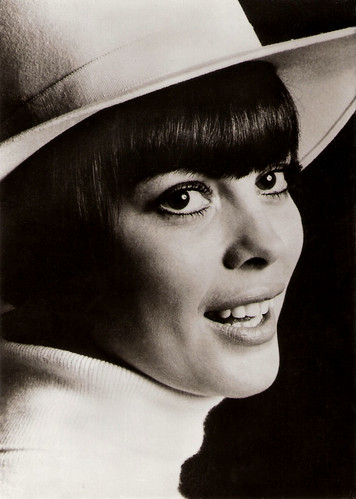
East-German postcard by VEB Bild und Heimat Reichenbach i.V., no. G 6646. Photo: Ariola / Marouani / Archiv Weise.
Mireille Mathieu was born in 1946 in Avignon, France. She was the eldest daughter of fourteen children of Roger and Marcelle Mathieu. The Mathieu family lived in poverty, with a huge improvement in their living conditions in 1954, when subsidised housing was built in the Malpeigné quarter. Roger once dreamed of becoming a singer, but his father disapproved, inspiring him to have one of his children learn to sing with him in church. Mireille included his operatic voice on her 1968 Christmas album, where it was mixed in with the Minuit Chrétiens song.
Mireille's first paid performance before an audience, at age four, was rewarded with a lollipop when she sang on Christmas Eve 1950 during Midnight Mass. A defining moment was seeing Édith Piaf sing on television. Mireille performed poorly in elementary school because of dyslexia, requiring an extra year to graduate.
At age 14, she abandoned higher education, and began work in a local factory where she helped with the family income and paid for her singing lessons. Popular at work, she often sang songs at lunch, or while working. Mathieu began her career by participating in an annual singing contest in Avignon called On Chante dans mon Quartier (We sing in my neighbourhood). Talent scouts made this a worthwhile event for singers within hundreds of kilometers to participate in.
Self-described as very stubborn in her autobiography, she wrote about singing love songs that the audience thought were inappropriate for a young girl. Thus, losing to Michèle Torr in 1962 when she sang Les cloches de Lisbonne at the first contest, and losing again in 1963 singing Édith Piaf's L'Hymne à l'amour. In 1964, though, she won the event with another Piaf song: La Vie en rose.
Her win was rewarded with a free trip to Paris, and a pre-audition for the televised talent show Jeu de la Chance (Game of Luck). This was a talent segment of the popular program Télé-Dimanche (TV Sunday), where amateur singers competed for audience and telephone votes.
During a 1965 summer gala, she met her future manager Johnny Stark. Stark had worked with singers such as Yves Montand, and the relationship between him and Mathieu is often described as resembling that between Colonel Tom Parker and Elvis Presley. Stark is credited with making her a star and the successor to Piaf. By 1968, under his careful management, she was France's most popular singer.
Mathieu appeared in cameos in several films, including the Russian production Zhurnalist/The Journalist (Sergey Gerasimov, 1967), the French comedy L'événement le plus important depuis que l'homme a marché sur la lune/A Slightly Pregnant Man (Jacques Demy, 1973) with Catherine Deneuve, the comedy La bonne année/Happy New Year (Claude Lelouch, 1973) and the French short C'est plus fort que moi/It’s stronger than me (Gilles Marchand, 1999).
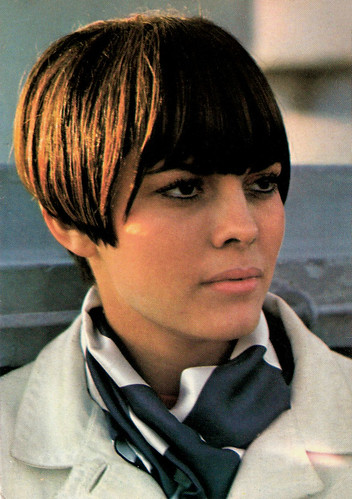
Belgian postcard by Edt. Decker, Brussels, no. A 106.
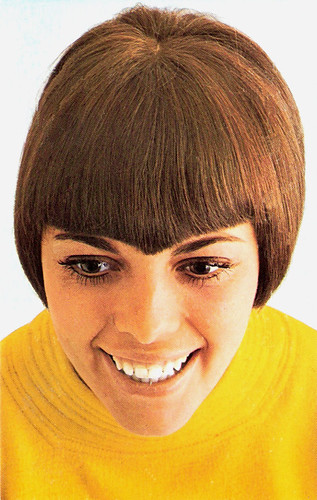
French postcard by Ed. Lyna, Paris, no. 2011, offered by Corvisart.
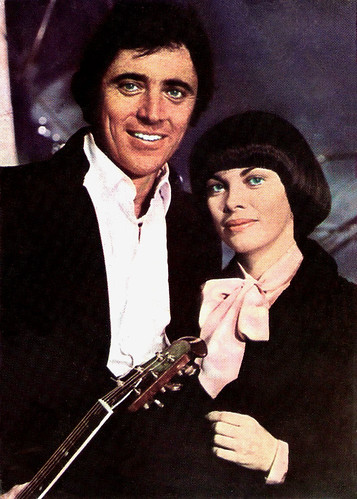
Romanian postcard by Casa Filmului Acin. With Sacha Distel.
In 1965, Mireille Mathieu was invited to Paris to sing on the TV show Song Parade and competed live on the Sunday 21 November 1965 episode of Jeu de la Chance. Both the studio audience and telephone voters gave her a slight lead over five-time winner Georgette Lemaire, so the producers called it a tie.
Johnny Stark officially became her manager that night, and helped prepare Mireille to win the contest the following week and bury Georgette. In the middle of her seven consecutive performances on Télé-Dimanche, she performed a concert at the Paris Olympia, which propelled her to stardom. She performed the only three Édith Piaf songs she had memorized, and was hailed in the press, in France and abroad, as the Piaf d'Avignon (Sparrow from Avignon), in reference to Piaf's nickname Sparrow of the Streets.
Stark then abandoned the Piaf direction he was taking her. The Olympia performance convinced a skeptical Paul Mauriat to work with Mathieu, and song writer André Pascal joined forces to develop her into a successful act. Together they wrote new modern material for her: Mon crédo, Viens dans ma rue, La première étoile and many other hit songs.
Her first album En Direct de L'Olympia was released in 1966. Highly acclaimed, the album made her a star outside France. A regular early contributor of material was Francis Lai, who wrote two songs: C'est ton nom, and Un homme et une femme for her first album, and often accompanied her with his accordion on television. Mireille spent all of 1966 and 1967 touring.
Her first major purchases were a vehicle for her father's business and a large home for her parents and siblings. She had a telephone installed for the family, so her parents no longer had to go to the pharmacy to talk to her while she was in Paris. Mireille sang twice at the London Palladium during royal performances in 1967, and in 1969. Her French cover of Engelbert Humperdinck's The Last Waltz (La dernière valse) generated much publicity in Great Britain and became a hit. She also toured Canada and the United States, where she appeared on The Ed Sullivan Show and The Danny Kaye Show. While on a visit to Hollywood, she met Elvis Presley, and in Las Vegas, Nevada she sang with Dean Martin and Frank Sinatra.
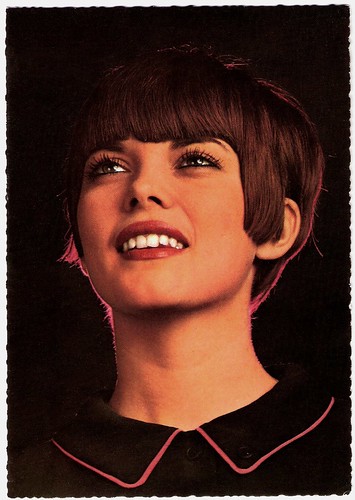
French postcard by PSG, no. 475. Photo: Alain / Disques Barclay.
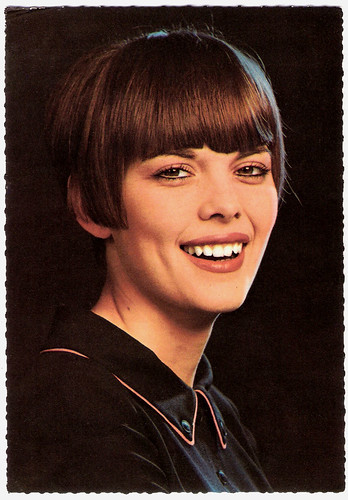
French postcard by PSG, no. 1290. Photo: Alain / Barclay.
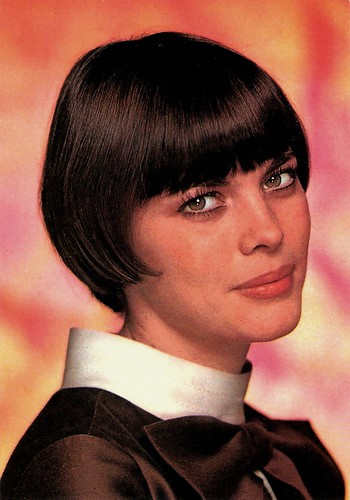
French postcard by E.D.U.G., Paris, no. 509. Photo: Sam Lévin.
During the next decades, Mireille Mathieu remained a popular artist in France and Europe. In 1971, Barclay was unable to meet the demands for records. Johnny Stark then made a contract for Philips Records to issue all the singles, and EPs, resulting in a US$1 Million lawsuit from Barclay for breach of contract. Barclay's contract was to run until 1972.
In 1972, Mathieu toured Canada and produced a live album. Johnny Stark suffered his first heart attack while making arrangements for this concert. In 1986, Mathieu performed a concert in Beijing, China. In 1988, Mathieu published her autobiography with co-author Jacqueline Cartier, Oui Je Crois (Yes, I Believe) which is taken from the lyrics of Mon crédo, her first recording.
The book was seen as a final chapter in her career. The French public had pretty much disowned her, as a conservative relic. She was considered a pre-revolution (1968) Gaullist figurehead. In 1989, President François Mitterrand invited Mathieu to sing a tribute to General Charles de Gaulle. Johnny Stark died the same year after his second heart attack.
Her sister Monique stepped in to become her business manager, and the two women have remained profitable in the industry ever since. In 1990, she gave a series of concerts at the Palais des Congrès in Paris. In 1993, she released two albums devoted to her idol, Édith Piaf, essentially retracing her roots. One album was in French; the other, in German.
In January 1996, Vous lui Direz was released, followed in 1999, by a German album Alles nur ein Spiel, with Francis Lai on accordion. In 2002, Mathieu released her thirty-seventh French album: De tes Mains, followed by a series of concerts at the Paris Olympia. In 2008, she was a guest of Prime Minister Vladimir Putin in Moscow, and performed a concert in his honor. The two visited the tent of visiting Libyan leader Muammar Gaddafi.
In 2010, Mireille Mathieu was awarded the Russian Medal of Friendship by President Dmitry Medvedev In January 2011, Mireille was promoted from Chevalier (1999) to Officier of the Légion d'honneur. Mathieu has never been married and has no children. She has recorded about 1200 songs in 9 different languages and has released 38 studio albums to date.
Original scopitone clip with Mireille Mathieu singing Mon crédo (1966). Source: TBH (YouTube).
Mireille Mathieu sings La vie en rose. Source: Hugo Reyes (YouTube).
Sources: Wikipedia and IMDb.

East-German postcard by VEB Bild und Heimat Reichenbach i.V., no. G 6645, 1972. Photo: Ariola / Marouani / Archiv Weise, Berlin.

East-German postcard by VEB Bild und Heimat Reichenbach i.V., no. G 6646. Photo: Ariola / Marouani / Archiv Weise.
Very stubborn
Mireille Mathieu was born in 1946 in Avignon, France. She was the eldest daughter of fourteen children of Roger and Marcelle Mathieu. The Mathieu family lived in poverty, with a huge improvement in their living conditions in 1954, when subsidised housing was built in the Malpeigné quarter. Roger once dreamed of becoming a singer, but his father disapproved, inspiring him to have one of his children learn to sing with him in church. Mireille included his operatic voice on her 1968 Christmas album, where it was mixed in with the Minuit Chrétiens song.
Mireille's first paid performance before an audience, at age four, was rewarded with a lollipop when she sang on Christmas Eve 1950 during Midnight Mass. A defining moment was seeing Édith Piaf sing on television. Mireille performed poorly in elementary school because of dyslexia, requiring an extra year to graduate.
At age 14, she abandoned higher education, and began work in a local factory where she helped with the family income and paid for her singing lessons. Popular at work, she often sang songs at lunch, or while working. Mathieu began her career by participating in an annual singing contest in Avignon called On Chante dans mon Quartier (We sing in my neighbourhood). Talent scouts made this a worthwhile event for singers within hundreds of kilometers to participate in.
Self-described as very stubborn in her autobiography, she wrote about singing love songs that the audience thought were inappropriate for a young girl. Thus, losing to Michèle Torr in 1962 when she sang Les cloches de Lisbonne at the first contest, and losing again in 1963 singing Édith Piaf's L'Hymne à l'amour. In 1964, though, she won the event with another Piaf song: La Vie en rose.
Her win was rewarded with a free trip to Paris, and a pre-audition for the televised talent show Jeu de la Chance (Game of Luck). This was a talent segment of the popular program Télé-Dimanche (TV Sunday), where amateur singers competed for audience and telephone votes.
During a 1965 summer gala, she met her future manager Johnny Stark. Stark had worked with singers such as Yves Montand, and the relationship between him and Mathieu is often described as resembling that between Colonel Tom Parker and Elvis Presley. Stark is credited with making her a star and the successor to Piaf. By 1968, under his careful management, she was France's most popular singer.
Mathieu appeared in cameos in several films, including the Russian production Zhurnalist/The Journalist (Sergey Gerasimov, 1967), the French comedy L'événement le plus important depuis que l'homme a marché sur la lune/A Slightly Pregnant Man (Jacques Demy, 1973) with Catherine Deneuve, the comedy La bonne année/Happy New Year (Claude Lelouch, 1973) and the French short C'est plus fort que moi/It’s stronger than me (Gilles Marchand, 1999).

Belgian postcard by Edt. Decker, Brussels, no. A 106.

French postcard by Ed. Lyna, Paris, no. 2011, offered by Corvisart.

Romanian postcard by Casa Filmului Acin. With Sacha Distel.
The Sparrow from Avignon
In 1965, Mireille Mathieu was invited to Paris to sing on the TV show Song Parade and competed live on the Sunday 21 November 1965 episode of Jeu de la Chance. Both the studio audience and telephone voters gave her a slight lead over five-time winner Georgette Lemaire, so the producers called it a tie.
Johnny Stark officially became her manager that night, and helped prepare Mireille to win the contest the following week and bury Georgette. In the middle of her seven consecutive performances on Télé-Dimanche, she performed a concert at the Paris Olympia, which propelled her to stardom. She performed the only three Édith Piaf songs she had memorized, and was hailed in the press, in France and abroad, as the Piaf d'Avignon (Sparrow from Avignon), in reference to Piaf's nickname Sparrow of the Streets.
Stark then abandoned the Piaf direction he was taking her. The Olympia performance convinced a skeptical Paul Mauriat to work with Mathieu, and song writer André Pascal joined forces to develop her into a successful act. Together they wrote new modern material for her: Mon crédo, Viens dans ma rue, La première étoile and many other hit songs.
Her first album En Direct de L'Olympia was released in 1966. Highly acclaimed, the album made her a star outside France. A regular early contributor of material was Francis Lai, who wrote two songs: C'est ton nom, and Un homme et une femme for her first album, and often accompanied her with his accordion on television. Mireille spent all of 1966 and 1967 touring.
Her first major purchases were a vehicle for her father's business and a large home for her parents and siblings. She had a telephone installed for the family, so her parents no longer had to go to the pharmacy to talk to her while she was in Paris. Mireille sang twice at the London Palladium during royal performances in 1967, and in 1969. Her French cover of Engelbert Humperdinck's The Last Waltz (La dernière valse) generated much publicity in Great Britain and became a hit. She also toured Canada and the United States, where she appeared on The Ed Sullivan Show and The Danny Kaye Show. While on a visit to Hollywood, she met Elvis Presley, and in Las Vegas, Nevada she sang with Dean Martin and Frank Sinatra.

French postcard by PSG, no. 475. Photo: Alain / Disques Barclay.

French postcard by PSG, no. 1290. Photo: Alain / Barclay.

French postcard by E.D.U.G., Paris, no. 509. Photo: Sam Lévin.
A conservative relic
During the next decades, Mireille Mathieu remained a popular artist in France and Europe. In 1971, Barclay was unable to meet the demands for records. Johnny Stark then made a contract for Philips Records to issue all the singles, and EPs, resulting in a US$1 Million lawsuit from Barclay for breach of contract. Barclay's contract was to run until 1972.
In 1972, Mathieu toured Canada and produced a live album. Johnny Stark suffered his first heart attack while making arrangements for this concert. In 1986, Mathieu performed a concert in Beijing, China. In 1988, Mathieu published her autobiography with co-author Jacqueline Cartier, Oui Je Crois (Yes, I Believe) which is taken from the lyrics of Mon crédo, her first recording.
The book was seen as a final chapter in her career. The French public had pretty much disowned her, as a conservative relic. She was considered a pre-revolution (1968) Gaullist figurehead. In 1989, President François Mitterrand invited Mathieu to sing a tribute to General Charles de Gaulle. Johnny Stark died the same year after his second heart attack.
Her sister Monique stepped in to become her business manager, and the two women have remained profitable in the industry ever since. In 1990, she gave a series of concerts at the Palais des Congrès in Paris. In 1993, she released two albums devoted to her idol, Édith Piaf, essentially retracing her roots. One album was in French; the other, in German.
In January 1996, Vous lui Direz was released, followed in 1999, by a German album Alles nur ein Spiel, with Francis Lai on accordion. In 2002, Mathieu released her thirty-seventh French album: De tes Mains, followed by a series of concerts at the Paris Olympia. In 2008, she was a guest of Prime Minister Vladimir Putin in Moscow, and performed a concert in his honor. The two visited the tent of visiting Libyan leader Muammar Gaddafi.
In 2010, Mireille Mathieu was awarded the Russian Medal of Friendship by President Dmitry Medvedev In January 2011, Mireille was promoted from Chevalier (1999) to Officier of the Légion d'honneur. Mathieu has never been married and has no children. She has recorded about 1200 songs in 9 different languages and has released 38 studio albums to date.
Original scopitone clip with Mireille Mathieu singing Mon crédo (1966). Source: TBH (YouTube).
Mireille Mathieu sings La vie en rose. Source: Hugo Reyes (YouTube).
Sources: Wikipedia and IMDb.
No comments:
Post a Comment